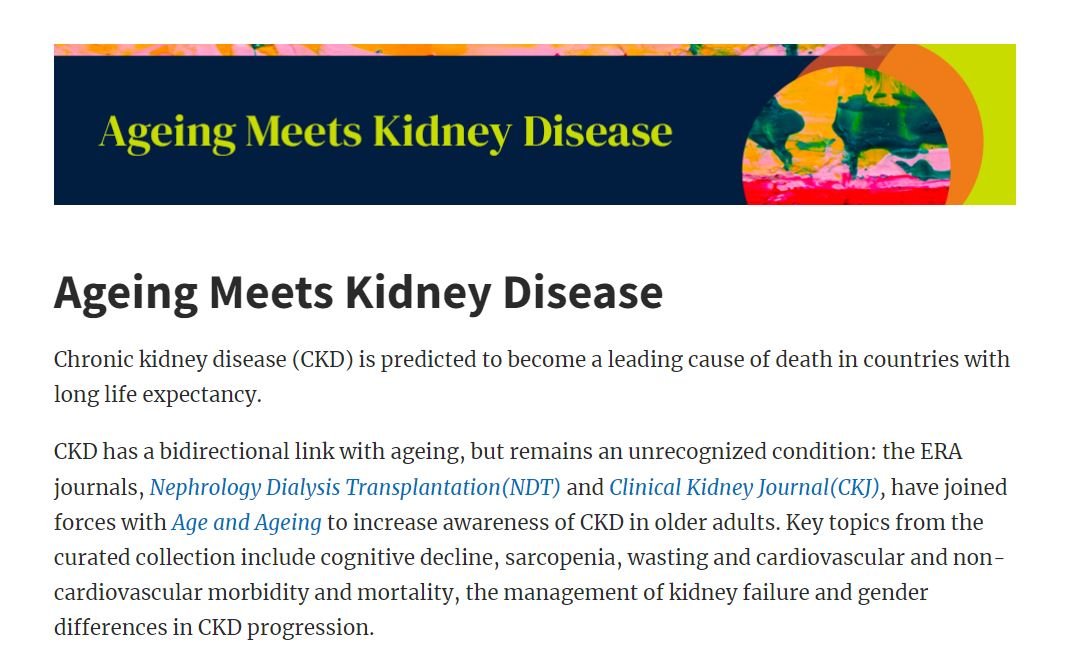Dr Andrew Nixon is a Consultant Nephrologist at Lancashire Teaching Hospitals NHS Foundation Trust. He has a clinical and research interest in geriatric nephrology. He has completed a PhD on ‘Frailty Assessment and Intervention in Chronic Kidney Disease’, was the Lancashire Teaching Hospitals’ Renal Project Lead for the Specialised Clinical Frailty Network and co-organised The Geriatric Nephrology Symposium 2021. He tweets @DrAndyNixon
Age and Ageing have collaborated with the European Renal Association (ERA) journals, Nephrology Dialysis Transplantation (NDT) and Clinical Kidney Journal (CKJ), to curate a collection of ‘Ageing Meets Kidney Disease’ articles. This anthology of outstanding original research studies highlights the complexities of managing older people living with chronic kidney disease (CKD) and, the need for more evidence to inform the care of this vulnerable group. In my opinion it also makes the case for greater collaborative working between nephrology and geriatric medicine. In fact, I would go as far as to say that there is a case for a more clearly defined clinical sub-specialty of geriatric nephrology, comprising nephrologists, geriatricians and allied healthcare professionals with a shared passion for improving the care of older people living with CKD.
Articles within the collection confirm that CKD is associated with cognitive impairment and worse physical function, which can go unnoticed if not for the vigilance of those caring for older people living with CKD. There is a need for proactive assessments of cognition, function and frailty, especially prior to the dialysis transition, after which there may be an accelerated decline in all three. The best approach to assessment and implementation of goal-orientated targeted intervention remains unknown, but there is an argument for comprehensive geriatric assessment, one that several researchers across the world have successfully made to grant review committees. Study findings should be available within the next few years, which hopefully will then translate into changes for the better in clinical practice.
Villain and colleagues describe older people living with CKD having a high prevalence of cardiovascular disease, yet older age paradoxically being associated with underuse of cardiovascular medications in CKD. There is a dearth of evidence on how best to manage older people with advanced CKD, especially those receiving dialysis, as this population is often not included within randomised controlled trials. The dilemma in clinical practice comes when trying to decide whether older people living with advanced CKD may benefit from treatments that become part of the routine management of younger adults with no or less severe kidney impairment. This is further complicated by the fact that this group can be prescribed numbers of medications going into double figures, and there is therefore a need to balance the potential benefits of prescribing additional medications against the risks of problematic polypharmacy.
Perhaps the greatest challenge when caring for this population is determining the comparative risks and benefits of future renal-specific management, namely transplantation, dialysis and conservative care (active medical management without dialysis). In-centre dialysis (dialysis in hospital) can often seem to be the default position for older adults, with transplantation viewed as too high risk, home dialysis therapies seen as too onerous and conservative care seen as the absence of treatment. Schaeffner advocates considered assessment, education and goal-setting with patients, relatives and caregivers; this should lead to more informed choices and ultimately patients realising their care goals. We still do not know how best to make this patient-centred care a reality, but that of course does not mean we should not try.
This curated collection details leading research achieved through nephrology and geriatric medicine communities working together. It shines a light not only on the difficulties facing older people with CKD, but also on the need for us to do significantly more to improve outcomes that matter most to patients. Going forward, I hope there is even greater collaboration between nephrology and geriatric medicine, both in research and clinical practice. Together we continue to strive for better care for older people living with CKD and say ‘No!’ to renal ageism.
Read the ‘Ageing Meets Kidney Disease’ collection here.
